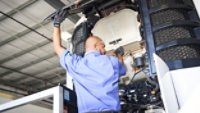Refrigeration Unit Maintenance Tips: Part 2

Tips for keeping your refrigeration unit operating despite changing conditions
We live in a constantly changing world. Whether it’s the changing of the seasons, adaption of new technologies, or new ways of doing business caused by a global pandemic, we learn to adjust to every new situation. While we’ve transformed our Thermo King refrigeration units over the years to meet the evolving needs of customers, we’ve held one thing constant—ensuring reliability. Two of our district service managers, Scott Koch and Freddy Muñoz, have outlined some ways that you can keep your refrigeration unit operating despite changing conditions.
Plan Ahead
Some units sit all winter and do not see regular maintenance so plan ahead to ensure uptime. Be sure to complete an annual PM or inspection. Verify the condition of critical components such as filters, oil, refrigerant, and battery charge.
Be Aware
Follow the Maintenance Inspection Schedule found in the unit maintenance manual. It is designed to guide a technician through the inspection by highlighting critical areas. A thorough PM inspection will identify potential issues that could cause an unscheduled breakdown. Unscheduled repairs can cause an immense disruption in fleet operation, especially if technician availability is reduced due to staggered shifts or social distancing safety measures.
The pandemic has changed the normal cadence of maintenance. Because some fleets are running fewer hours and parking equipment for an extended time, they might need to start the units to recharge a battery and check to ensure fuel has not gone stagnant or collected moisture. This will ensure that equipment will be in top shape when asked to return to service.
A download of a unit – known as Service Watch download – can provide a history of the unit’s performance over the last three months. A trained Thermo King technician can review that information and provide insights into possible issues that may have not manifested into alarm codes.
PreTrip Inspection
Following a good “pretrip” inspection prior to every load will help prevent costly repairs. The automated pretrip found in Thermo King units also checks multiple electronic component operations as well as cooling/heating operation. This helps ensure the reefer is ready to protect the load.
These pretrip inspections test the functionality of the system over the course of a 15-minute comprehensive diagnostics check. The cost in time for running a pretrip versus the cost of a load loss acts as extra insurance. Additionally, the pretrip is done independent of the operator, so other work can be conducted during these 15 minutes.
The pretrip results show a pass/check/fail code. Drivers should never clear alarms without further investigation. The SOP (standard operating procedure) will determine the next steps for each fleet.
Despite changing conditions, you can follow these tips to keep your refrigeration unit operating and your fleet on the road.

